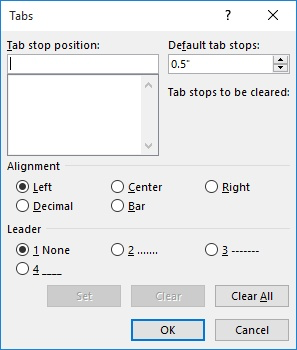Please Note: This article is written for users of the following Microsoft Word versions: 2007, 2010, 2013, 2016, 2019, 2021, and Word in Microsoft 365. If you are using an earlier version (Word 2003 or earlier), this tip may not work for you. For a version of this tip written specifically for earlier versions of Word, click here: Setting Decimal Tabs in a Table Using the Keyboard.
Written by Allen Wyatt (last updated May 18, 2024)
This tip applies to Word 2007, 2010, 2013, 2016, 2019, 2021, and Word in Microsoft 365
If you love using the keyboard, you may wonder if there is a way to set decimal tabs in a table using the keyboard. Unfortunately, there is no simple, fast keystroke to set the decimal tabs. The best way is to use the regular accelerator keys that Word uses. You would follow these steps:

Figure 1. The Tabs dialog box.
If you would rather not go through such an easy-to-remember process (grin), then you can also create a macro that will do the trick, and assign the macro to a shortcut key. The following is an example of a simple VBA macro that would do the job:
Sub SetDecimal()
Dim MyTab As String
MyTab = InputBox("Location (inches):", "Set Decimal Tab")
If Val(MyTab) > 0 Then
With Selection.ParagraphFormat.TabStops
.ClearAll
.Add Position:=InchesToPoints(Val(MyTab)), _
Alignment:=wdAlignTabDecimal, _
Leader:=wdTabLeaderSpaces
End With
End If
End Sub
This macro, which should be run after the cell or column is selected, prompts the user to enter a value for the new tab stop, clears all the existing tabs in the selection, and then sets the desired decimal tab stop.
Note:
WordTips is your source for cost-effective Microsoft Word training. (Microsoft Word is the most popular word processing software in the world.) This tip (11758) applies to Microsoft Word 2007, 2010, 2013, 2016, 2019, 2021, and Word in Microsoft 365. You can find a version of this tip for the older menu interface of Word here: Setting Decimal Tabs in a Table Using the Keyboard.

Comprehensive VBA Guide Visual Basic for Applications (VBA) is the language used for writing macros in all Office programs. This complete guide shows both professionals and novices how to master VBA in order to customize the entire Office suite for their needs. Check out Mastering VBA for Office 2010 today!
Word allows you to use leader dots with your tab stops. If you want to space out the leader dots, you are limited in what ...
Discover MoreIf you have a constant need to define tabs at the edge of the right margin, you'll love the macro-based technique ...
Discover MoreTab stops allow you to modify the horizontal position at which text is positioned on a line. If you want to get rid of ...
Discover MoreFREE SERVICE: Get tips like this every week in WordTips, a free productivity newsletter. Enter your address and click "Subscribe."
There are currently no comments for this tip. (Be the first to leave your comment—just use the simple form above!)
Got a version of Word that uses the ribbon interface (Word 2007 or later)? This site is for you! If you use an earlier version of Word, visit our WordTips site focusing on the menu interface.
Visit the WordTips channel on YouTube
FREE SERVICE: Get tips like this every week in WordTips, a free productivity newsletter. Enter your address and click "Subscribe."
Copyright © 2025 Sharon Parq Associates, Inc.
Comments